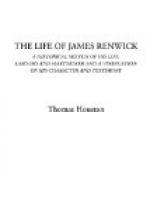II.—THE LIMITS OF PUBLIC AUTHORITY, AND OF A PEOPLE’S ALLEGIANCE.
A question was raised in the later times of the persecution of difficult solution, but of vast practical importance. This was the due limit of submission to civil rulers, and the withdrawal of allegiance and submission from those who had violated their compact with the people, and had trampled under foot their constitutional rights. It is ably shown by Dr. D’Aubigne,[2] as had been done before, that civil freedom and religious reformation, originating with the people, have ever been closely united and advanced together. Wherever the principles of evangelical truth have been rightly understood and firmly maintained, the people have refused to tolerate civil oppression. “He is a freeman whom the truth makes free.” All genuine civil freedom is based on religious liberty. Calvinism, as is admitted even by many who are opposed to it as a doctrinal system, has been the irreconcileable foe of despotism all over the world;—by the heroic struggles, and cheerful sacrifices of its adherents, the battle of freedom has been fought, and its triumphs achieved in many lands. Particularly in Scotland, where the Reformation, from the first, originated with the people, and was carried forward in opposition to the mandates of arbitrary rulers, and notwithstanding the relentless persecution of the civil powers, the eminent instruments whom God honoured for advancing the truth, all along contended for the liberties of their country, and earnestly pleaded that the duties of rulers and ruled should be clearly defined, and the rights of the people settled on a constitutional basis. This was the plea of the illustrious Knox, as is seen in his expostulations with the Queen and nobles of Scotland, and in his intercourse with the statesmen of the day—English and Scottish—and in his writings. The




